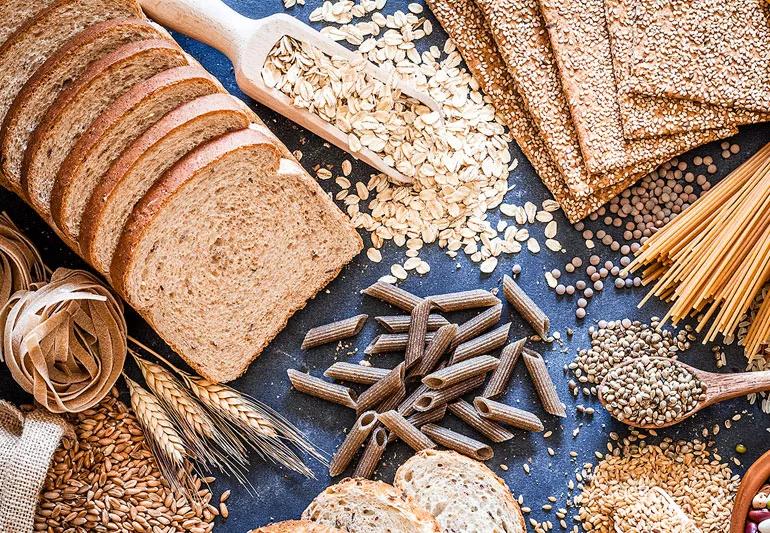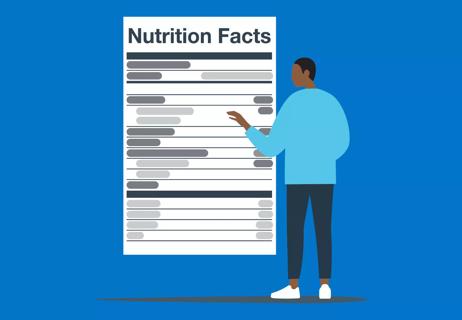Advertisement
A diet rich in whole grains improves gut health, protects your heart and may reduce cancer risk

Eating right can help improve your cardiovascular and overall health, but food labels and names can be confusing.
Advertisement
Cleveland Clinic is a non-profit academic medical center. Advertising on our site helps support our mission. We do not endorse non-Cleveland Clinic products or services. Policy
That’s especially true when it comes to grains. Most of us have grown up hearing that it’s important to eat whole grains. Still, a walk down the bread aisle in your grocery store can start to feel a bit like a vocabulary test: Your grains can be whole, yes, but they can also be refined, enriched, fortified, coarse, fine … and don’t get us started on the mystery that is “multigrain”!
How can you make sure the grains you’re eating are the right ones?
We talked with dietitian Erin Rossi, RD, LD, to learn what whole grains are, exactly, why they’re so good for you and how to find them.
In their original, whole state (unprocessed), grains like wheat, oats, kasha and rice have outer layers or coats. Whole grains are first harvested as a whole grain kernel consisting of layers of bran, germ and endosperm.
These layers contain healthy vitamins, minerals and fiber, as well as carbohydrates, protein and healthy unsaturated fats.
But processed (or refined) grains have their healthy outer layers stripped off. This milling process mechanically removes the bran — the fiber-rich outer layer which contains B vitamins and minerals. Milling also removes the germ layer, which contains essential fatty acids and vitamin E.
That’s why you want to keep your grains whole as often as you can, Rossi states. Although some foods made from processed grains have nutrients added back in to make them healthier, even enhanced or “enriched” foods made from refined grains lack the healthy properties that naturally occur in the whole, unprocessed kind.
A diet that’s rich in whole grains can help you:
Advertisement
So, we know what whole grains are and why they’re good for us, but what exactly should we be eating if we’re looking to enrich our diets?
Many pantry staples fit the bill, including:
If you aren’t already cooking with them, you can also consider adding the following whole grains into your diet:
“Buying prepared foods can be tricky, especially when you look for foods made from whole grains,” Rossi notes. These tips can help:
Advertisement
In the past few years, a growing chorus of influencers, diet peddlers and self-appointed “experts” have claimed whole grains aren’t any better than refined grains. Not only do they suggest whole grains aren’t good for you, but some also go so far as to argue they’re actively bad for you. They claim whole grains are chock full of “anti-nutrients” and are responsible for the ever-increasing number of people living with chronic health conditions.
But the science doesn’t back those ideas up. And neither does Rossi.
While there’s a limit to the amount of carbohydrates you should consume in a day — and some are better than others — whole grains are an important source of macronutrients and are foundational to a balanced diet.
Rossi’s advice? “Opt for whole grains and avoid refined grains.” If you do that, you’re maximizing the benefits of these complex carbohydrates and giving your body the fuel it needs, without spiking your blood sugar.
Whether you’re an oatmeal aficionado, a freekah fanatic or a rye guy, keep eating the whole grains you enjoy: They’re good for you! And don’t be afraid to experiment with grains you’ve never tried before.
“There are so many delicious recipes that use whole grains instead of processed grains,” Rossi encourages. “And you can feel good about every recipe you make when you use them.”
Advertisement
Learn more about our editorial process.
Advertisement

What’s on your plate can either help power you through your day or put you in nap mode

Information on serving size, calories and nutrients can help you make healthy choices

Often labeled as ‘diabetes-friendly’ or ‘calorie-free,’ these sugar substitutes warrant caution

Repeating your meals can help simplify meal planning and counting calories, but it could also lead to boredom and nutritional deficiencies

Obesity, age and preexisting heart conditions can all raise your risk of cardiovascular disease during pregnancy

Making certain food and lifestyle choices can help keep your battery full

Fiber-rich shirataki noodles may improve blood sugar, aid in digestion and help with weight loss

Reducing inflammation is key when you’re in a flare-up, but so is having a preventive nutritional plan in place when you’re not

Focus on your body’s metabolic set point by eating healthy foods, making exercise a part of your routine and reducing stress

PFAS chemicals may make life easier — but they aren’t always so easy on the human body

While there’s little risk in trying this hair care treatment, there isn’t much science to back up the claims